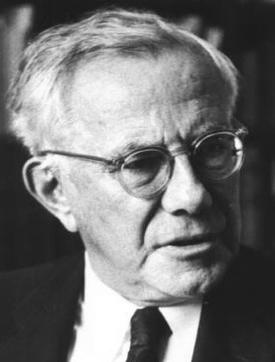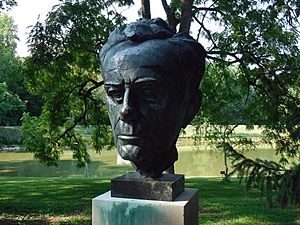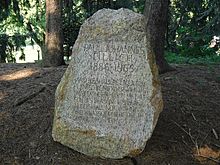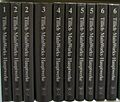Paul Tillich facts for kids
Quick facts for kids
Paul Tillich
|
|
|---|---|
 |
|
| Born |
Paul Johannes Tillich
August 20, 1886 Starzeddel, Province of Brandenburg, Prussia, German Empire
|
| Died | October 22, 1965 (aged 79) |
| Nationality | German American |
| Occupation | Theologian and philosopher |
|
Notable work
|
|
| Spouse(s) | Hannah |
| Children | René (b. 1935), Mutie (b. 1926) |
| Theological work | |
| Language |
|
| Tradition or movement | Christian existentialism |
| Main interests |
|
| Notable ideas |
|
Paul Johannes Tillich (born August 20, 1886 – died October 22, 1965) was a very important German-American thinker. He was a philosopher (someone who studies big questions about life) and a theologian (someone who studies God and religious beliefs). He was one of the most influential religious thinkers of the 1900s.
Tillich taught at universities in Germany before he moved to the United States in 1933. In the U.S., he taught at famous schools like Union Theological Seminary, Harvard Divinity School, and the University of Chicago.
He wrote popular books like The Courage to Be (1952) and Dynamics of Faith (1957). These books helped many people understand his ideas. His main work, a three-part series called Systematic Theology (1951–63), was written for other theologians. In it, he explored how Christian beliefs connect with modern ideas about life.
Many other important thinkers, like Martin Luther King Jr., studied Tillich's work. His ideas are still discussed and studied today around the world.
Contents
Paul Tillich's Life Story
Tillich was born on August 20, 1886, in a small village called Starzeddel in Germany. He was the oldest of three children. His father, Johannes Tillich, was a conservative Lutheran pastor. His mother, Mathilde Dürselen, was from a different part of Germany and had more open-minded views.
When Paul was four, his family moved to a town called Bad Schönfliess. He started primary school there. In 1898, he went to a boarding school in Königsberg in der Neumark for his high school education. He felt lonely there and spent a lot of time reading the Bible. At school, he also learned about Humanism, which focuses on human values and reason.
In 1900, his father moved to Berlin, and Paul joined him in 1901. He finished school in Berlin in 1904. Sadly, his mother died in September 1903 when he was 17. After high school, he attended several universities, including the University of Berlin and the University of Halle-Wittenberg. He earned his Doctor of Philosophy degree in 1911 and became a licensed theologian in 1912.
In 1912, Tillich became a Lutheran minister. In 1914, he married Margarethe Wever. Soon after, he joined the Imperial German Army as a chaplain during World War I. He served in the trenches, helping soldiers and burying friends. He was hospitalized several times due to the stress of war and received an award for his bravery. He returned from the war deeply affected.
After the war, Tillich began his career as a university teacher in Berlin. In 1924, he married Hannah Werner-Gottschow. They stayed together throughout their lives.
From 1924 to 1933, Tillich taught at various universities in Germany, including the University of Marburg and the University of Frankfurt. During this time, he started to develop his main ideas about theology. He also worked with other famous thinkers like Martin Heidegger.
While teaching in Frankfurt, Tillich gave many public talks. His ideas often went against the Nazi movement that was growing in Germany. Just ten weeks after Adolf Hitler became Germany's leader, Tillich was one of the first professors fired from his job because of his beliefs.
A friend, Reinhold Niebuhr, visited Germany in 1933 and heard about Tillich's situation. Niebuhr invited Tillich to teach at Union Theological Seminary in New York City, and Tillich accepted.
At 47 years old, Tillich moved to the United States with his family. He had to learn English, which became the language for his later books. From 1933 to 1955, he taught at Union Theological Seminary. In 1940, he became an American citizen.
At Union, Tillich became very well known. He published books that combined Christian theology with ideas about human existence. His sermons, collected in books like The Shaking of the Foundations, helped him reach an even wider audience.
His most famous achievements were the first volume of his Systematic Theology (1951) and The Courage to Be (1952). The Courage to Be was especially popular and read by many people. These works led him to teach at Harvard Divinity School in 1955. In 1959, he was even featured on the cover of Time magazine.
In 1961, Tillich helped start the Society for the Arts, Religion and Contemporary Culture. He continued to publish, including the second volume of Systematic Theology and Dynamics of Faith in 1957. In 1962, he moved to the University of Chicago, where he taught until his death.
The third volume of his Systematic Theology came out in 1963. Many people recognized him as one of the greatest thinkers of his time.
Paul Tillich died on October 22, 1965, after a heart attack. His ashes were buried in Paul Tillich Park in New Harmony, Indiana. His gravestone has a quote from the Bible: "And he shall be like a tree planted by the rivers of water, that bringeth forth his fruit for his season, his leaf also shall not wither. And whatsoever he doeth shall prosper." (Psalm 1:3)
Paul Tillich's Ideas
Tillich's ideas combine philosophy and theology. He explored deep questions about what it means to exist and how we understand God.
What is "Being"?
Tillich often used the idea of "being" (Sein in German) in his work. He thought about what it means for something to exist. He believed that "being" is the deepest mystery of thought.
He said that God is "being-itself." This means God is not just one thing among many, but the very power that makes everything exist. God is the source of all "being."
God as the Ground of Being

Tillich saw God as "being-itself," the "ground of being," and the "power of being." This means God is beyond simply existing like other things. He disagreed with the idea of God as just the "highest being" among others. For Tillich, if God were just a being, God couldn't be the source of all existence.
He believed that all living things face the threat of "nonbeing" (not existing). But humans are special because we can ask about "being-itself." This is because we are connected to something beyond not existing, which is "being-itself" (God).
Tillich also talked about how we use personal words to describe God. He said it's okay and necessary to talk about God in a personal way, like in the Bible. But he warned against thinking of God as just another person or object. God is both personal and beyond personal.
Tillich's idea of God as the "ground of being" has roots in old Christian and Greek ideas. He also believed in a "living God" that is always active.
He said that God is "the answer to the question implied in man's finitude." This means God helps us understand our limits and fears. Tillich believed that if God wasn't the "ground of being," God couldn't help us with our deepest worries.
Tillich argued that thinking of God as a "being" (like a giant person controlling everything) can make people feel like they have no freedom. This idea of God, he said, has led to some people becoming atheists (not believing in God). He called this "theological theism" and thought it was a "bad theology."
Instead, Tillich said God is the "Abyss" or "Abysmal Being." This means God is the deep, endless source that gives power to everything that exists. God is not an object we can study, because God comes before the idea of subjects and objects.
He also believed that any statements we make about God are symbolic. They are like pointers to the "Ground of Being," not exact descriptions. These symbols are sacred because they help us connect with this ultimate reality.
How Tillich Connected Ideas
Tillich used a special way of thinking called the "method of correlation." This method connects ideas from Christian beliefs with questions from human life, psychology, and philosophy.
He explained it like this:
- Philosophy helps us ask the big questions about what it means to be human and to exist.
- Christian beliefs provide the answers to these questions.
So, a philosopher's job is to ask the questions, and a theologian's job is to find the answers in religious teachings. But these two jobs are connected. The answers from faith must make sense in response to the questions from human experience.
For example, God is called the "ground of being" because God is the answer to our fear of not existing. This way of describing God uses philosophical terms to answer a human question.
Tillich also said that the answers come from different sources:
- The Bible
- The history of the Christian Church
- The history of other religions and cultures
Our own experiences help us understand these sources. The main goal of theology, for Tillich, was to show how "New Being in Jesus as the Christ" is the answer to our feelings of being lost or separated.
Life and the Spirit
In his Systematic Theology, Tillich also talked about "life and the divine Spirit." He believed that life is always changing and moving forward. He saw history as the way life moves towards the future. He thought that understanding history helps us understand life itself.
Absolute Faith
Tillich believed that having the courage to face meaninglessness comes from connecting to the "ground of being." He called this "absolute faith." This kind of faith goes beyond simply believing in a traditional idea of God.
He said absolute faith has three parts:
- Feeling the power of "being" even when things seem meaningless. This power helps us resist despair.
- Understanding that even in despair, we still have enough "being" to feel that despair. And meaninglessness depends on the idea of meaning.
- Accepting that we are accepted, even when we feel unacceptable. This "power of acceptance" is experienced even when there's no one specific to accept us. This is the deepest kind of faith.
Faith as Ultimate Concern
Tillich believed that the core of religious feeling is what he called "ultimate concern." This is something so important to a person that it matters more than anything else. It's seen as sacred and demands complete dedication.
He explained that humans care about many things, but an "ultimate concern" is something that demands everything from us. All other concerns become less important.
Tillich also said that faith is "ecstatic." This means it goes beyond just our thoughts or feelings. It's a passionate connection to what matters most to us.
He even said that atheists can have "ultimate concern." Everyone has something they care about most deeply, and that can be an act of faith, even if they don't use the word "God."
The Courage to Be
In his book The Courage to Be, Paul Tillich defined courage as standing strong in your existence, even when you feel threatened by "nonbeing" (the idea of not existing). He linked courage to anxiety, saying that anxiety is the threat of non-being, and courage is how we fight that threat. Tillich described three main types of anxiety and how we show courage against them:
1. Anxiety of Fate and Death: * This is the most basic fear: knowing we will die. We feel anxious when we worry about what will happen to us or when we realize death is unavoidable. * We show courage when we stop relying on others to tell us what will happen after we die and start seeking those answers for ourselves. This is called the "courage of confidence."
2. Anxiety of Guilt and Condemnation: * This fear affects our sense of right and wrong. We are responsible for our actions. We feel anxious when we realize we haven't lived up to our own standards or feel we are not good enough. * We show courage by first admitting our mistakes or what causes us guilt. Then, we trust that we are accepted anyway, even if we feel unacceptable.
3. Anxiety of Meaninglessness and Emptiness: * This fear attacks our whole purpose in life. We worry about losing our main goal or feeling like we have no place in the world. It can also come from a loss of spiritual connection. * We show courage by having true faith and believing in ourselves. Tillich said we can draw strength from the "power of being" (which is God for him) to find our meaning and purpose.
Tillich wrote that the ultimate source of courage comes from the "God above God." This idea goes beyond the usual way of thinking about God and is part of "absolute faith," which is accepting that you are accepted even when there's no one specific doing the accepting.
Paul Tillich's Political Views
Tillich believed in socialism, a political idea where society works together for the good of everyone. After World War I, he became involved with groups that combined religious beliefs with socialist ideas.
He thought that capitalism (an economic system focused on individual wealth) didn't fit with Christian values. While he wasn't a Communist, he respected some of Karl Marx's ideas about how society works.
Tillich wrote a book called The Socialist Decision in the early 1930s, when the Nazis were gaining power in Germany. The Nazi government quickly banned his book. In it, Tillich described Nazism as a type of "political romanticism." He said this was a way of thinking that looked back to old myths about where humans came from, often using ideas like "blood" (family ties) and "soil" (land) to support old social structures. He argued that this kind of thinking stopped progress and new ideas.
Tillich also saw liberalism (a political idea focused on individual rights and freedom) as connected to capitalism. He thought liberalism gave freedom to wealthy business owners but not to everyone else. However, he liked liberalism's focus on individual rights and equality. He believed that to truly achieve freedom, liberalism needed to separate from capitalism and embrace democratic socialism.
Popular Books by Tillich
Two of Tillich's books, The Courage to Be (1952) and Dynamics of Faith (1957), were very popular. Many people, even those who didn't usually read religious books, enjoyed them.
In The Courage to Be, he talked about three basic types of anxiety:
- Fear of death (knowing we will die).
- Fear of guilt (worrying about our moral actions).
- Fear of meaninglessness (feeling lost or without purpose).
Tillich connected these fears to different times in history. His popular books have influenced not only theology but also psychology. For example, the psychologist Rollo May was inspired by The Courage to Be when he wrote his book The Courage to Create.
Images for kids
See also
 In Spanish: Paul Tillich para niños
In Spanish: Paul Tillich para niños
- Philosophical theology
- Christian existentialism
- Systematic theology
- List of American philosophers
- Neo-orthodoxy
- Panentheism
- Postmodern Christianity
- Theistic Personalism
- Existential Thomism
 | Jackie Robinson |
 | Jack Johnson |
 | Althea Gibson |
 | Arthur Ashe |
 | Muhammad Ali |



